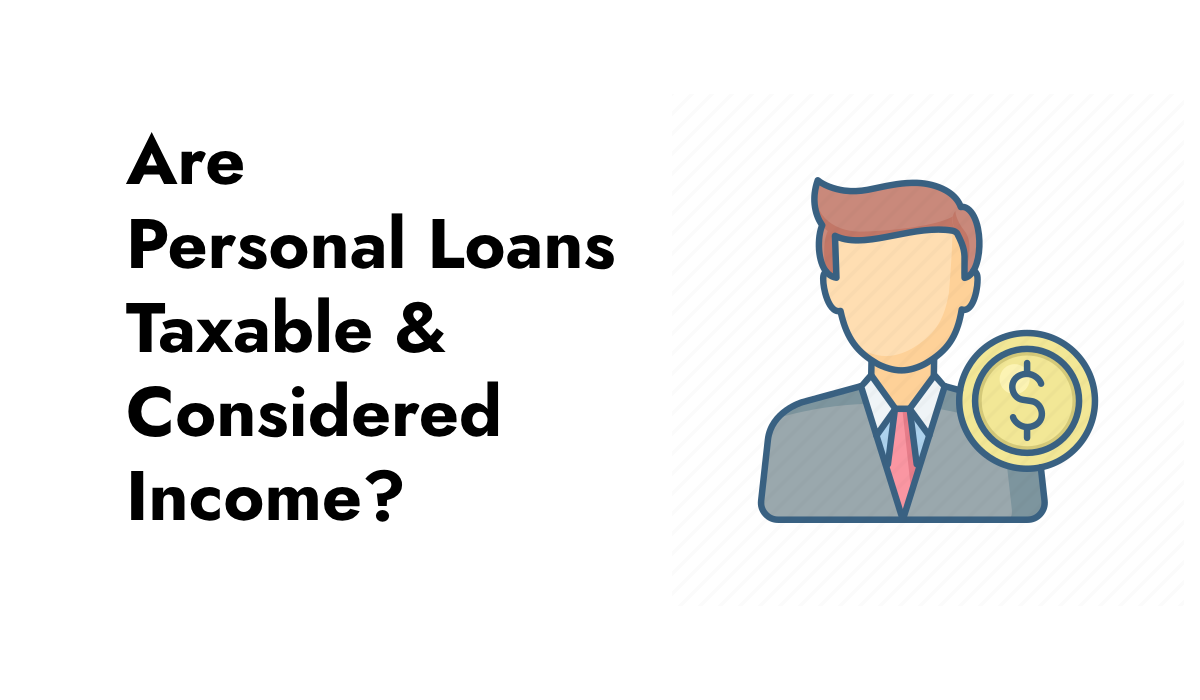You might be wondering if personal loans are taxed and if you should include any papers for them in that pile. As you prepare for tax season, you’ll need to organize your documentation, including income, expenses, and assets forms.
Your loan is simply that—a loan. Personal loans are rarely used during tax season. However, there are a few cases where you may notice an influence. Here, you will learn how to approach your debts while filing your taxes.
Best personal loan

- Est. APR = 6.99%
- Loan type : Personal
- Loan amount: $1k - $50k
- Min credit score: 580
4.3
editorial team. We score based on factors
that are helpful for consumers, such as
how it affects credit scores, the rates and
fees charged, the customer experience,
and responsible lending practices.
Best personal loan for bad credit
- Est. APR = 6.99-35.99%
- Loan Amount = $100-$40K
- Min Credit Score = 300
4.8
editorial team. We score based on factors
that are helpful for consumers, such as
how it affects credit scores, the rates and
fees charged, the customer experience,
and responsible lending practices.
Best personal loan for bad credit

- Est. APR = 9.99 - 39.99%
- Loan Amount = $1k - $50k
- Min Credit Score = 580
4.8
editorial team. We score based on factors
that are helpful for consumers, such as
how it affects credit scores, the rates and
fees charged, the customer experience,
and responsible lending practices.
Best Personal Loan for No Credit

- Est. APR 7.80% - 35.99%
- Loan amount $1k– $50k
- Min credit score 300
4
editorial team. We score based on factors
that are helpful for consumers, such as
how it affects credit scores, the rates and
fees charged, the customer experience,
and responsible lending practices.

- Est. APR 5.99% to 35.99%
- Loan amount $500 to $5,000
- Min credit score = Any
3.7
editorial team. We score based on factors
that are helpful for consumers, such as
how it affects credit scores, the rates and
fees charged, the customer experience,
and responsible lending practices.
- Est. APR 5.99%-35.99%
- Loan amount $1Kto $35K
- Min credit score = 580
4.4
editorial team. We score based on factors
that are helpful for consumers, such as
how it affects credit scores, the rates and
fees charged, the customer experience,
and responsible lending practices.
- Flexible loan amounts
- 24/7 Support
- No prepayment fees
4
editorial team. We score based on factors
that are helpful for consumers, such as
how it affects credit scores, the rates and
fees charged, the customer experience,
and responsible lending practices.
Related: Leading Personal Loan Providers for Debt Consolidation
Do Personal Loans Count As Income?
A personal loan can be used for nearly anything, including emergency expenses, weddings, and house repairs. They are typically unsecured loans, meaning they do not require an asset to borrow money. Secured loans, such as auto loans and mortgages, require collateral to secure the loan.
Loans are not considered income because income is earned via employment or investment. You do not make money from your loan; you borrow money to repay it.
Related: How to Get a Personal Loan With Bad Credit
Are personal loans taxable?
Personal loans are not taxable; thus, you do not need to record them in your income taxes. However, in some cases, a personal loan may have tax ramifications.
Your loan is considered debt. Don’t worry, as long as you’re on pace to repay it. However, if a portion of your loan is canceled, you may be in a totally different situation, potentially costly.
What Happens If Your Personal Loan Is Cancelled?
If you fall behind on payments or are unable to afford your loan, you may be transferred to collections and eventually default on it. If you engage with a credit management firm or file for bankruptcy, you may be able to negotiate a payment plan or have a portion of your loan canceled.
In such circumstances, the lender issues a cancellation of debt (COD) for the canceled amount. A COD indicates you are no longer accountable for repaying your loan. When you file and report the canceled amount, your lender will send you a 1099-C form, which you must submit with your tax return.
Let’s say you borrow $10,000. You pay the first $5,000, but then an unanticipated financial difficulty occurs, leaving you unable to pay the remaining $5,000 principal. The lender can cancel the remaining $5,000 of your loan. What does this mean to you? Come tax season, you’ll be expected to record the remaining $5,000 as income, so you’ll have to pay taxes on it.
Best personal loan

- Est. APR = 6.99%
- Loan type : Personal
- Loan amount: $1k - $50k
- Min credit score: 580
4.3
editorial team. We score based on factors
that are helpful for consumers, such as
how it affects credit scores, the rates and
fees charged, the customer experience,
and responsible lending practices.
Best personal loan for bad credit
- Est. APR = 6.99-35.99%
- Loan Amount = $100-$40K
- Min Credit Score = 300
4.8
editorial team. We score based on factors
that are helpful for consumers, such as
how it affects credit scores, the rates and
fees charged, the customer experience,
and responsible lending practices.
Best personal loan for bad credit

- Est. APR = 9.99 - 39.99%
- Loan Amount = $1k - $50k
- Min Credit Score = 580
4.8
editorial team. We score based on factors
that are helpful for consumers, such as
how it affects credit scores, the rates and
fees charged, the customer experience,
and responsible lending practices.
Best Personal Loan for No Credit

- Est. APR 7.80% - 35.99%
- Loan amount $1k– $50k
- Min credit score 300
4
editorial team. We score based on factors
that are helpful for consumers, such as
how it affects credit scores, the rates and
fees charged, the customer experience,
and responsible lending practices.

- Est. APR 5.99% to 35.99%
- Loan amount $500 to $5,000
- Min credit score = Any
3.7
editorial team. We score based on factors
that are helpful for consumers, such as
how it affects credit scores, the rates and
fees charged, the customer experience,
and responsible lending practices.
- Est. APR 5.99%-35.99%
- Loan amount $1Kto $35K
- Min credit score = 580
4.4
editorial team. We score based on factors
that are helpful for consumers, such as
how it affects credit scores, the rates and
fees charged, the customer experience,
and responsible lending practices.
- Flexible loan amounts
- 24/7 Support
- No prepayment fees
4
editorial team. We score based on factors
that are helpful for consumers, such as
how it affects credit scores, the rates and
fees charged, the customer experience,
and responsible lending practices.


 Read More
Read More 




